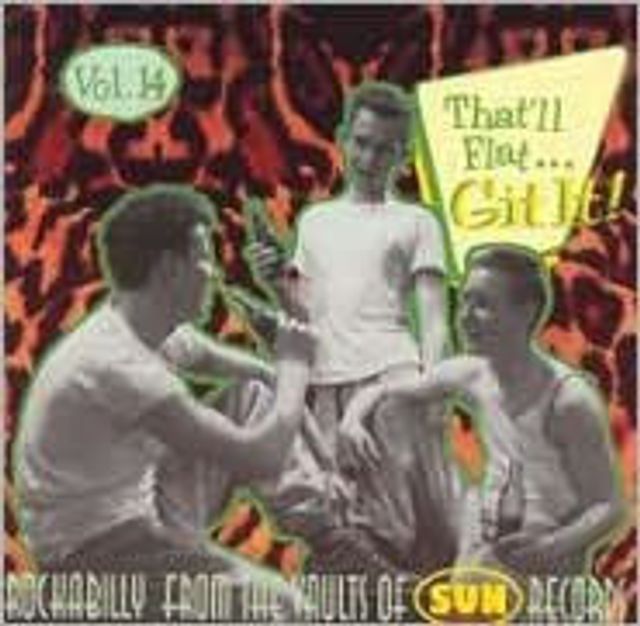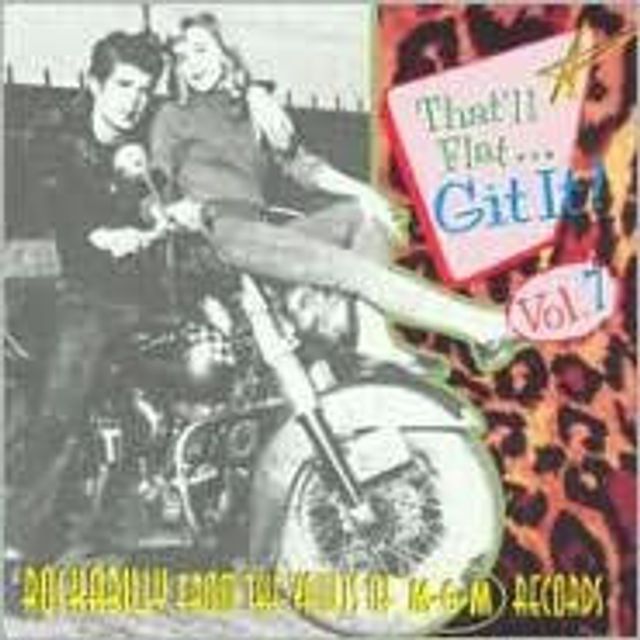Home
That'll Flat Git It!, Vol. 14
Loading Inventory...
Barnes and Noble
That'll Flat Git It!, Vol. 14
Current price: $19.99


Barnes and Noble
That'll Flat Git It!, Vol. 14
Current price: $19.99
Loading Inventory...
Size: OS
*Product Information may vary - to confirm product availability, pricing, and additional information please contact Barnes and Noble
Among reissue and archival labels, only
Bear Family Records
could get to Volume 14 of a series and not have purchasers begin to feel like the concept was getting milked a bit, along with their wallets. This particular collection, indeed, will prove nothing less than essential for fans of rockabilly or early rock & roll, as well as devotees of
Sun Records
, though the reasons may be a little more complicated than the title of this volume suggests at first glance. "Rockabilly from the Vaults of
Sun
Records" might prove deceptively unappealing to the casual purchaser, as there is no shortage of rockabilly sides from
to choose from on CD, and from perfectly respectable reissue labels apart from
Bear Family
-- but this 31-song CD is very different from those. And the key can be found in the wording -- the music is "from" the vaults of
, but much of it was never actually issued by the label. Rather, the songs here mostly represent material found in the
vaults that
Sam Phillips
never released, and demos by people who he never signed, for whatever reasons. So what we have is truly an alternate universe of artists and sounds, in the context of
-- people and music that mostly never made the cut but which, in theory, might have. And some should have --
Glenn Honeycutt
, whose
"Rock All Night"
opens this CD, was obviously a serious talent with at least one song to match; and
Dick Penner
, who co-wrote
"Ooby Dooby,"
very obviously had something more than enthusiasm and energy to offer, as proved by
"Move Baby, Move."
Jumpin' Gene Simmons
is substantially less impressive here with
"Pop and Mama,"
but
Jimmy Haggett
's
"Rock Me Baby"
could easily have charted in 1955 or 1956.
Jimmy Wages
'
"Take Me (Garden of Evil)"
is downright bizarre, a river of words and strangely contradictory sentiments running like rapids -- rapids that
Wages
barely traverses safely in his frantic tempo and accompaniment.
Smokey Joe Baugh
"Hula Bop,"
by contrast, is rockabilly with a smooth country element -- though those tom-toms over the break run counter to the almost elegant steel guitar, and his raspy reading of the last verse and the honky tonk piano on the second break is a great surprise. Based on
"Drive In,"
Mack Vickery
could have been
's successor to
Carl Perkins
after the latter left the label, but it wasn't to be -- nor were most of
Vickery
's later opportunities to pan out. Not everyone represented here was exactly comfortable with rock & roll, much less rockabilly --
Roger Fakes
was clearly more of a balladeer, than a rock & roll balladeer, based on
"Somehow We'll Find a Way,"
but it's still worth hearing what he had to say. And then there's
Kenny Parchman
, whose contracts were signed, releases scheduled, and. . . nothing -- except that
"Treat Me Right,"
even in 2009, comes off like a rockabilly classic, with the personality, the hooks, and the beat to put it over. Not quite so
"Christine"
by
Roy Hall
, mentor to
Jerry Lee Lewis
and co-author of
"Whole Lotta Shakin' Goin' On,"
which is fun but no classic.
Ken Cook
"Problem Child,"
by contrast, is a lost hit -- a pounding, driving rendition of the
Roy Orbison
tune. And
Curley Money
"Chain Gang Charlie"
is worth the price of admission, a pounding piece of rock & roll that should have ruled the airwaves in 1956. And that brings us to
Andy Anderson
and
the Rolling Stones
-- no, not
Brian
,
Mick
Keith
, et al, but
Joe Tubb
(lead guitar),
Billy Covington
(bass), and
Bobby Lyon
(drums).
"Tough Tough Tough"
never made it onto
, but it should have, as tight and powerful a record as they would ever have issued this side of
Elvis
' work. The whole CD is like peering into a lost side of history and seeing more than a few undeservedly forgotten talents -- not just
Elvis Presley
wannabes, but a few should-have-beens as well. As with most
releases, the sound is impeccable -- especially given that none of this material was ever supposed to see the light of day in the form we have it -- and the annotation by
Colin Escott
is, needless to say, extremely thorough. ~ Bruce Eder
Bear Family Records
could get to Volume 14 of a series and not have purchasers begin to feel like the concept was getting milked a bit, along with their wallets. This particular collection, indeed, will prove nothing less than essential for fans of rockabilly or early rock & roll, as well as devotees of
Sun Records
, though the reasons may be a little more complicated than the title of this volume suggests at first glance. "Rockabilly from the Vaults of
Sun
Records" might prove deceptively unappealing to the casual purchaser, as there is no shortage of rockabilly sides from
to choose from on CD, and from perfectly respectable reissue labels apart from
Bear Family
-- but this 31-song CD is very different from those. And the key can be found in the wording -- the music is "from" the vaults of
, but much of it was never actually issued by the label. Rather, the songs here mostly represent material found in the
vaults that
Sam Phillips
never released, and demos by people who he never signed, for whatever reasons. So what we have is truly an alternate universe of artists and sounds, in the context of
-- people and music that mostly never made the cut but which, in theory, might have. And some should have --
Glenn Honeycutt
, whose
"Rock All Night"
opens this CD, was obviously a serious talent with at least one song to match; and
Dick Penner
, who co-wrote
"Ooby Dooby,"
very obviously had something more than enthusiasm and energy to offer, as proved by
"Move Baby, Move."
Jumpin' Gene Simmons
is substantially less impressive here with
"Pop and Mama,"
but
Jimmy Haggett
's
"Rock Me Baby"
could easily have charted in 1955 or 1956.
Jimmy Wages
'
"Take Me (Garden of Evil)"
is downright bizarre, a river of words and strangely contradictory sentiments running like rapids -- rapids that
Wages
barely traverses safely in his frantic tempo and accompaniment.
Smokey Joe Baugh
"Hula Bop,"
by contrast, is rockabilly with a smooth country element -- though those tom-toms over the break run counter to the almost elegant steel guitar, and his raspy reading of the last verse and the honky tonk piano on the second break is a great surprise. Based on
"Drive In,"
Mack Vickery
could have been
's successor to
Carl Perkins
after the latter left the label, but it wasn't to be -- nor were most of
Vickery
's later opportunities to pan out. Not everyone represented here was exactly comfortable with rock & roll, much less rockabilly --
Roger Fakes
was clearly more of a balladeer, than a rock & roll balladeer, based on
"Somehow We'll Find a Way,"
but it's still worth hearing what he had to say. And then there's
Kenny Parchman
, whose contracts were signed, releases scheduled, and. . . nothing -- except that
"Treat Me Right,"
even in 2009, comes off like a rockabilly classic, with the personality, the hooks, and the beat to put it over. Not quite so
"Christine"
by
Roy Hall
, mentor to
Jerry Lee Lewis
and co-author of
"Whole Lotta Shakin' Goin' On,"
which is fun but no classic.
Ken Cook
"Problem Child,"
by contrast, is a lost hit -- a pounding, driving rendition of the
Roy Orbison
tune. And
Curley Money
"Chain Gang Charlie"
is worth the price of admission, a pounding piece of rock & roll that should have ruled the airwaves in 1956. And that brings us to
Andy Anderson
and
the Rolling Stones
-- no, not
Brian
,
Mick
Keith
, et al, but
Joe Tubb
(lead guitar),
Billy Covington
(bass), and
Bobby Lyon
(drums).
"Tough Tough Tough"
never made it onto
, but it should have, as tight and powerful a record as they would ever have issued this side of
Elvis
' work. The whole CD is like peering into a lost side of history and seeing more than a few undeservedly forgotten talents -- not just
Elvis Presley
wannabes, but a few should-have-beens as well. As with most
releases, the sound is impeccable -- especially given that none of this material was ever supposed to see the light of day in the form we have it -- and the annotation by
Colin Escott
is, needless to say, extremely thorough. ~ Bruce Eder


















